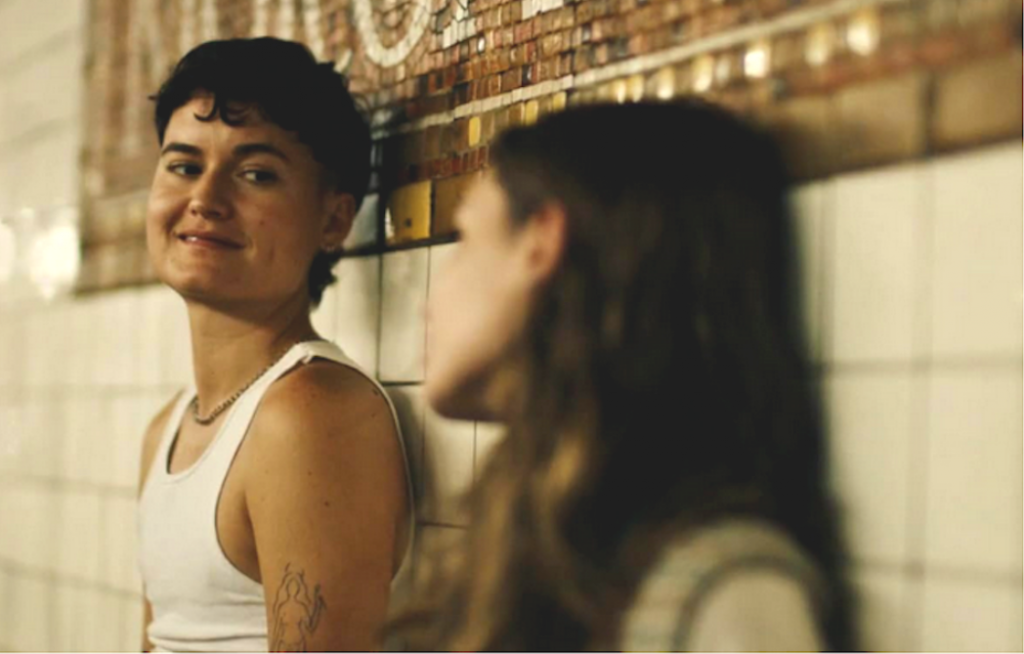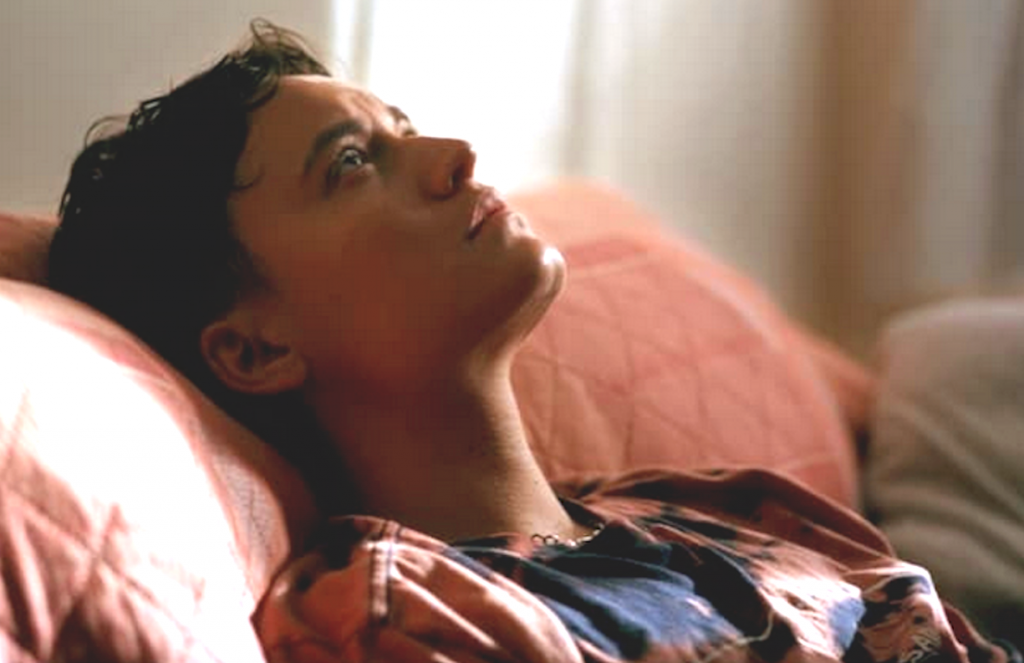
By Gary M. Kramer–
Trans writer/director Vuk Lungulov-Klotz makes an auspicious feature debut with his sensitive, moody drama, Mutt. This compelling filmdepicts an emotional 24 hours in the life of Feña (Lîo Mehiel), a Latinx transman in New York City. While in a bar with friends, Feña spots his ex, John (Cole Doman). Their meeting is awkward at first, however, as they spend some time together, they consider recoupling. Feña’s life is further complicated when his estranged sister, Zoe (MiMi Ryder), wants to spend the day with him—she has run away from school. Feña is also preparing to pick up his father, Pablo (Alejandro Goic), who is arriving from Chile, for what is sure to be an intense reunion.
Mehiel’s lived-in performance won an acting prize at Sundance, and Doman provides solid support as John, a man grappling with his desires for his ex. Lungulov-Klotz spoke with me for the San Francisco Bay Times about Mutt.

Gary M. Kramer: What prompted you to tell this story and in the way that you did—the day in the life of a transman who has three very significant encounters?
Vuk Lungulov-Klotz: Why tell this story? Isn’t it obvious? There aren’t that many trans stories. I was starving for one. Not only for myself, but for other people around me and kids. Seeing yourself on screen within our culture gives you the right to exist in some capacity, so I really wanted to give myself and everyone else around me that right and show a transguy being sexy and messy and whatever he wants to be.
There are a lot of things in the film that are similar to my life. I have a Serbian father and a Chilean mother and a split-up family. I have a little sister and I have complicated relationships. Some things that happened to me happened after the film. I wrote Mutt about things I was afraid of—being loved and being accepted by my family and society—and that grew into this movie.
I wanted to immerse someone in what it feels like to be trans for 24 hours. I wanted this film to reach a lot of people and show a trans person being seen. But I also wanted someone who had never met a trans person to walk out feeling more connected to the subject matter and feel they have a trans friend.

Gary M. Kramer: Can you talk about your visual approach to the film? You create moments of intimacy, as if we are eavesdropping on the characters. It is very compelling, and the look of the film is quite striking with dark tones and shadows, golden light, and scenes that are shot from above, or afar but also in extreme closeup.
Vuk Lungulov-Klotz: I’m a big voyeur. I really like looking at people and people watching. Shadows and silhouettes are a great way to show Feña go through spaces as a body. My trans lens has a lot to do with being watched and watching. When you see me, are you seeing the version of me that I see and feel? That’s important—being seen the way you want to be seen. I also like stealing glances, and little moments like the father in the bedroom. It is a gift to sit with someone in such an important moment of their life.
Gary M. Kramer: What decisions did you make about depicting Feña’s transness in the film? This goes beyond showing his body, or the way he was deadnamed, denied access at the bank because of his ID, or his having to explain transness is not a “choice.” I appreciated how the film talked about transness, trans bodies, and the trans experience.
Vuk Lungulov-Klotz: A lot of queer films that are not made by queer people end up pushing out the queer audiences. I wanted to make a trans film that mirrors reality. I say “trans” a few times a day, whether it is with friends or someone new. Explaining yourself is part of being trans right now. It is a heavy burden to have, and I put Feña in these specific situations—with an ex-boyfriend, a father, and a little sister, where he gets different points of view thrown at him and he has to navigate that, which is like codeswitching. That’s something queer people do all the time.
I think a very “trans lens” scene is the laundromat scene. There was a divided debate—a few trans people thought it was the sexiest scene, other people were terrified John was going to hurt Feña. Some didn’t think it was sexy at all. It was a trans person inviting you to look at them; “You can touch my body,” and feeling powerful in the way of being looked at, and that John has lingering feelings about Feña. It’s a trans-gaze scene. I never saw a trans guy be sexy on screen. That’s why the laundromat scene is so important for me to feel powerful and seen.
Gary M. Kramer: What informed all of the obstacles Feña encountered during his day?
Vuk Lungulov-Klotz: It’s such a subtle thing, but a lot of queer people—trans, gay—who have to come out in some capacity build up so many walls that I wanted to have Feña have people who are not in the queer community—like a little sister, like a dad, and an ex-boyfriend, and they are trying to reach out more and he’s the one being prickly. I also really wanted to show a transman having to take the day after pill, and remind people that [many] transmen have uteruses. Once you start passing or are out as trans, people want to erase your body anatomy and past knowledge.

Gary M. Kramer: What about the theme of change in the film? Feña’s interactions with John, Zoe, and his father all have consequences.
Vuk Lungulov-Klotz: I wanted to show a father who was complex and not saying the right things, but at the end, you understand all of his fear is misinterpreted love. Some parents kick their kids out when they are gay because they are terrified they will be killed, and they would rather erase that person from their mind—and it’s awful—but all of those things do come from love. You get his father’s story at the end.
It is about understanding that when someone transitions, you immediately have a “before” and “after” moment. Everyone has to edit the version of “you” they have in their head, and it’s a pretty cathartic experience to question—did I see this person right when they were growing up? Even though it is one person transitioning, everyone has to change, and Feña is starting to understand that they have to mourn the person they knew. And that is a hard thing. Their parent is losing something; meanwhile, you, as the trans person, are finally feeling yourself and nothing has changed.
Gary M. Kramer: We can’t help but root for Feña, but is he his own worst enemy?
Vuk Lungulov-Klotz: All the obstacles are Feña trying to prove he is not a f—up. The privilege of being an antihero on screen is reserved for very few people. Feña is sweet but he is selfish. He wants to have sex with an ex instead of taking care of his sister. He is very selfish, and I love him for that.
© 2023 Gary M. Kramer
Gary M. Kramer is the author of “Independent Queer Cinema: Reviews and Interviews,” and the co-editor of “Directory of World Cinema: Argentina.” Follow him on Twitter @garymkramer
Arts & Entertainment
Published on August 24, 2023
Recent Comments